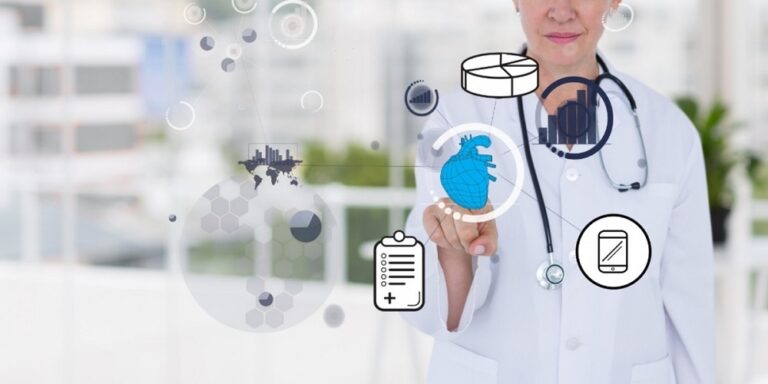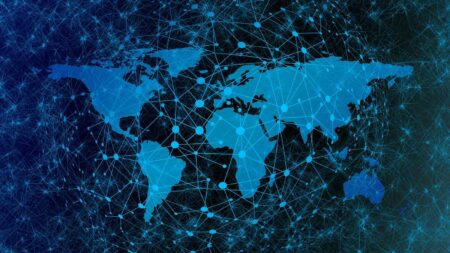Because of the COVID-19 epidemic, the healthcare industry is in the spotlight. As technology changes, this industry sector, which is growing, also changes. Telemedicine is one of the most well-known trends in technology. It lets doctors diagnose and treat patients from a distance. These technological advances can be integrated into healthcare apps to improve services. But it takes work to develop an app for healthcare care. There are over 400,000 healthcare apps in app stores, but most of them have been downloaded less than 10,000 times, based on app usage. However, some technology trends can be very important to the success of an app and can lead to positive changes in the sector. These are the top app development trends that will be most popular in the healthcare industry.
Top Healthcare App Development Trends
Check out the list of the best Healthcare App Development Trends.
1. Artificial Intelligence (AI)
You can’t say for sure that AI won’t be used in any industry. AI is a strong trend in healthcare app development. Well, AI is used for more than just administrative tasks in healthcare. AI will soon be able to help patients with clinical tasks through an app. AI’s uses in healthcare are endless, from robot-assisted surgery to virtual nursing assistants. AI-based healthcare apps can connect machines and automate image diagnosis. They also help doctors figure out what’s wrong. By 2021, AI’s healthcare market share is expected to be worth more than $6.6 billion. This is a trend that is worth watching.
2. Telemedicine
Even though this isn’t a new idea in healthcare, the app development process for healthcare has yet to adopt fully. Telemedicine has been a major trend in healthcare care for the past few years. But adding the mobile app to it is making it more popular. Telemedicine is becoming more popular because it is a cheap way for hospitals to diagnose and treat far-away patients. With the app in place, the healthcare care industry will have more chances to grow.
3. Big Data
It can play a big role in promoting mobile healthcare, so the healthcare sector has quickly adopted it. Big data technology is already an important part of the EHR field (Electronic Health Records). It can be an important development of making apps for healthcare care. Big Data was made to improve data security and make it easier for users to access corporate data. This idea can now play a bigger role in healthcare care by giving services to more patients and better care.
4. Internet Of Things (IoT)
In the age of wearables, it’s not surprising that the IoT healthcare industry is expected to grow to $158 billion. IoT is a game-changer for healthcare, and by integrating IoT advances, mHealth technologies could reach new heights. An IoT-based healthcare app can help improve patient health, raise awareness about preventive care, and improve the industry care is managed. IoT integration has a lot of uses in healthcare care. There are also ingestible sensors, connected lenses, and fitness and activity trackers. IoT healthcare apps can give users full control and let them share vital information with their doctors in real-time.
5. AR/VR Technologies
Augmented Reality (VR) and Virtual Reality (AR) still have a long way to go in app development for healthcare. A government report says AR and VR ideas will have a $5.1 billion market share in healthcare by 2025. Healthcare apps can change AR and VR in a big way. For example, traumatized patients can get better with the help of virtual reality. AR and VR technology can treat, train, rehabilitate, and diagnose.
6. Gamification
Even though this is not a new area for mobile app development, it is gaining popularity in the healthcare sector. The healthcare sector looks at Gamification as a way to improve healthcare services. With fitness, medical training, and health awareness games, Gamification can open new healthcare doors.
7. Chatbots
It has changed the way that eCommerce and retail work. Chatbots have already changed how customer service and customer support are done. They are now ready to use their apps to give personalized and instant experiences to patients who need healthcare care. The market for healthcare chatbots is expected to grow at a rate of 20% annually until 2030. This will soon be clear in mHealth apps, and apps will be used to improve patient care even more.
8. Cloud Services
It has a lot to offer the healthcare care sector. Cloud computing is needed in all industries, including the healthcare sector. SaaS, PaaS, and IaaS models can help the healthcare care sector. For example, the cloud-based app lets doctors quickly access patient health records whenever needed. Adding the cloud to a healthcare app will change how the industry looks and what it will do in the future.
9. Blockchain
In the BFSI industry, this technology is already well-known. Developers often put this technology into mobile apps to protect financial information and information that is private to a company. Now, blockchain technology can be used to keep medical records safe. With this technology, healthcare apps can keep patient information very safe.
10. Voice Assistant
One example is Google Assistant. It’s great for patients to tell their doctors about their symptoms and situations from anywhere. You can use your voice to find the right doctor near you. Voice technology is now used in many hospitals to improve the patient experience. Healthcare apps can use voice technology to improve search results and patient responses. In addition, hospitals and doctors can use this technology to advertise their services.
Conclusion:
The Healthcare app development industry will evolve because of these technology trends. With the help of advanced healthcare apps, patients can get more personalized and integrated healthcare care services no matter where they live. It will be interesting to see how these top trends affect the healthcare industry in the next few years.



